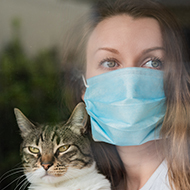
Researchers identified that the whole genome sequence was similar to the variant in humans.
A study from the University of Pennsylvania has discovered one example of apparent interspecies transmission of the SARS-CoV-2 delta variant which did not cause the virus to gain a significant number of mutations.
Published in Viruses, the study identified a domestic house cat which was treated at the university's Ryan Hospital that was infected with the delta variant after contact with its owner, who had tested positive for the virus.
Researchers discovered that the full genome sequence of the virus in the cat was a close match to viral sequences circulating in humans in the Philadelphia region at that time.
Dr Elizabeth Lennon, senior author of the study, commented: “SARS-CoV-2 has a really incredibly wide host range. What this means to me is that, as SARS-CoV-2 continues to be prevalent in the human population, we need to watch what's happening in other animal species as well.
"When we looked at a random sampling of human sequences from our geographic area, there wasn't anything dramatically different about our cat's sample. A main takeaway here is that as different variants of SARS-CoV-2 emerge, they seem to be retaining the ability to infect a wide range of species.”



 The Veterinary Medicines Directorate (VMD) is inviting applications from veterinary students to attend a one-week extramural studies (EMS) placement in July 2026.
The Veterinary Medicines Directorate (VMD) is inviting applications from veterinary students to attend a one-week extramural studies (EMS) placement in July 2026.